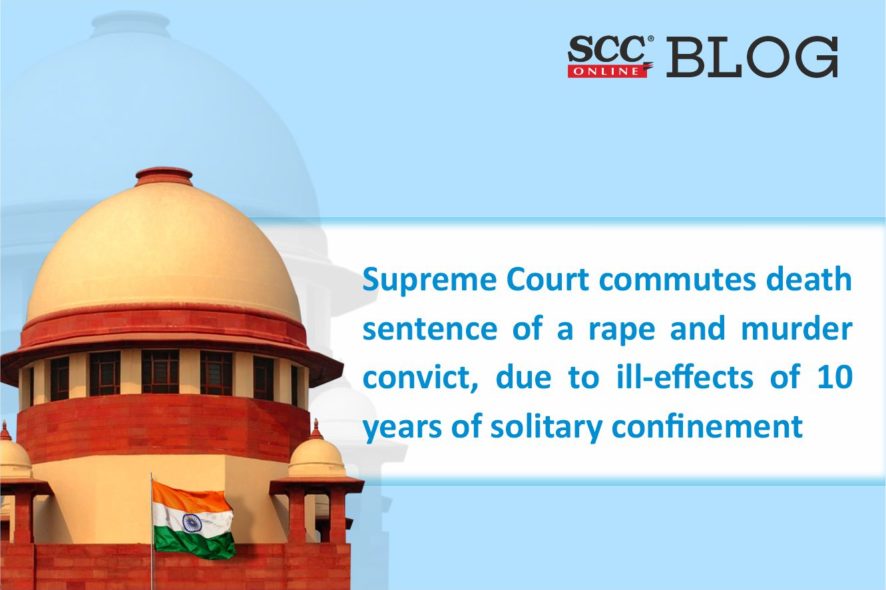Supreme Court: In appeal against the judgment passed by the Karnataka High Court three-judge bench of Uday Umesh Lalit*, C.J., S. Ravindra Bhat and PS Narasimha, JJ. has held that the time taken by the authorities, in the case at hand, for the disposal of mercy petition of a death row convict cannot be termed as “inordinate delay”, however, the incarceration in solitary confinement did show ill effects on the well-being of the appellant, thus, held that the appellant is entitled to have the death sentence to be commuted to imprisonment for life.
In the case at hand, the appellant was convicted under Sections 302, 376 and 392 of the Penal Code, 1860 and was awarded death sentence by the Trial Court. After that, the appellant filed criminal appeal in the High Court challenging his conviction, wherein the Court confirmed the order of conviction, but disagreed on the sentence to be imposed, but later affirmed the award of death sentence. Then, the appellant filed an appeal in the Supreme Court, wherein the Court upheld the High Court’s decision. The appellant then preferred a petition seeking mercy within seven days after the dismissal of his appeal by the Supreme Court and preferred a review petition against the decision passed by the Court. The mercy petition was rejected by the President and the Court dismissed the review petition and affirmed the award of death sentence.
The appellant then filed a writ petition, wherein the High Court passed the following judgment:
-
There is no excessive, unexplained, inordinate delay attributable to the respondents in deciding the mercy petition.
-
There is no violation of the petitioner’s right under Article 21 of the Constitution of India
-
All the relevant and crucial materials required for deciding the mercy petition were placed before, the Governor and the President and nothing has been kept out of consideration.
-
The Petitioner cannot be said to have been kept in solitary confinement.
The Court while considering the submission regarding delay in execution of death sentence due to pendency of mercy petition, referred to Ajay Kumar Pal v. Union of India, (2015) 2 SCC 478 wherein it was held that “if there is undue, unexplained and inordinate delay in execution of death sentence due to pendency of mercy petitions or the executive as well as the constitutional authorities have failed to consider the relevant aspects, this Court is well within its powers under Article 32 to hear the grievance of the convict and commute the death sentence into life imprisonment on this ground alone, however, the delay must not be caused at the instance of the accused himself”.
The Court said that the delay in Ajay Kumar (supra) was of 3 years and 10 months which was found to be inordinate, and that said delay was not to the account of said petitioner but to the account of the authorities; however, in the present case the entire period spanning over a period of 2 years and 3 months saw disposal of mercy petition at two different levels, one, by the Governor and other by the President. Further, there was a stay order granted by this Court on which was operating all through.
Thus, the Court said that the time taken by each of these authorities and the functionaries assisting them cannot be termed as “inordinate delay” and it was not as if every passing day was adding to the agony of appellant. Further, the Court while referring to A.G. Perarivalan v. State, 2022 SCC OnLine SC 635, said that the facts of this case stand on a completely different footing as against the instant matter, as in this case, no decision was taken by the Governor despite the recommendations of the State Cabinet and as such the benefit of commutation was extended.
Placing reliance on Sunil Batra v. Delhi Admn., (1978) 4 SCC 494 and on Ajay Kumar Pal (supra), wherein it was held that “segregation of a convict from the day when he was awarded death sentence till disposal of his mercy petition, would be in violation of law laid down in Sunil Batra case ”, and held that the incarceration of the appellant in solitary confinement and segregation from 2006 to 2013 was without the sanction of law and completely opposed to the principles laid down in Sunil Batra case.
The Court noted that in the instant case, the period of solitary confinement is for about ten years and has two elements: one, from 2006 till the disposal of mercy petition in 2013; and secondly from the date of such disposal till 2016. Thus, the question arises that, whether on this ground alone, the appellant is entitled to have the death sentence commuted?
The Court viewed that the impact of solitary confinement was obviously evident in the instant case as per the letter given by the medical professional. Thus, the Court held that the appellant is entitled to have the death sentence to be commuted to imprisonment for life.
Moreover, the Court to meet the ends of justice, while commuting the death sentence, imposed upon the appellant, sentence of life imprisonment with a rider that he shall undergo minimum sentence of 30 years, and if any application for remission is moved, the same shall be considered on its own merits only after he has undergone actual sentence of 30 years.
Further, the Court observed that an anomalous situation, like the present one, may arise where even before the review is filed, the mercy petition is required to be filed, thus, the instruction concerned requires suitable modification to enable the convict to file a mercy petition after exhaustion of remedies in Court of law.
[B.A. Umesh v. Union of India, 2022 SCC OnLine SC 1528, decided on 04-11-2022]
*Judgment by: Chief Justice Uday Umesh Lalit
*Apoorva Goel, Editorial Assistant has reported this brief






